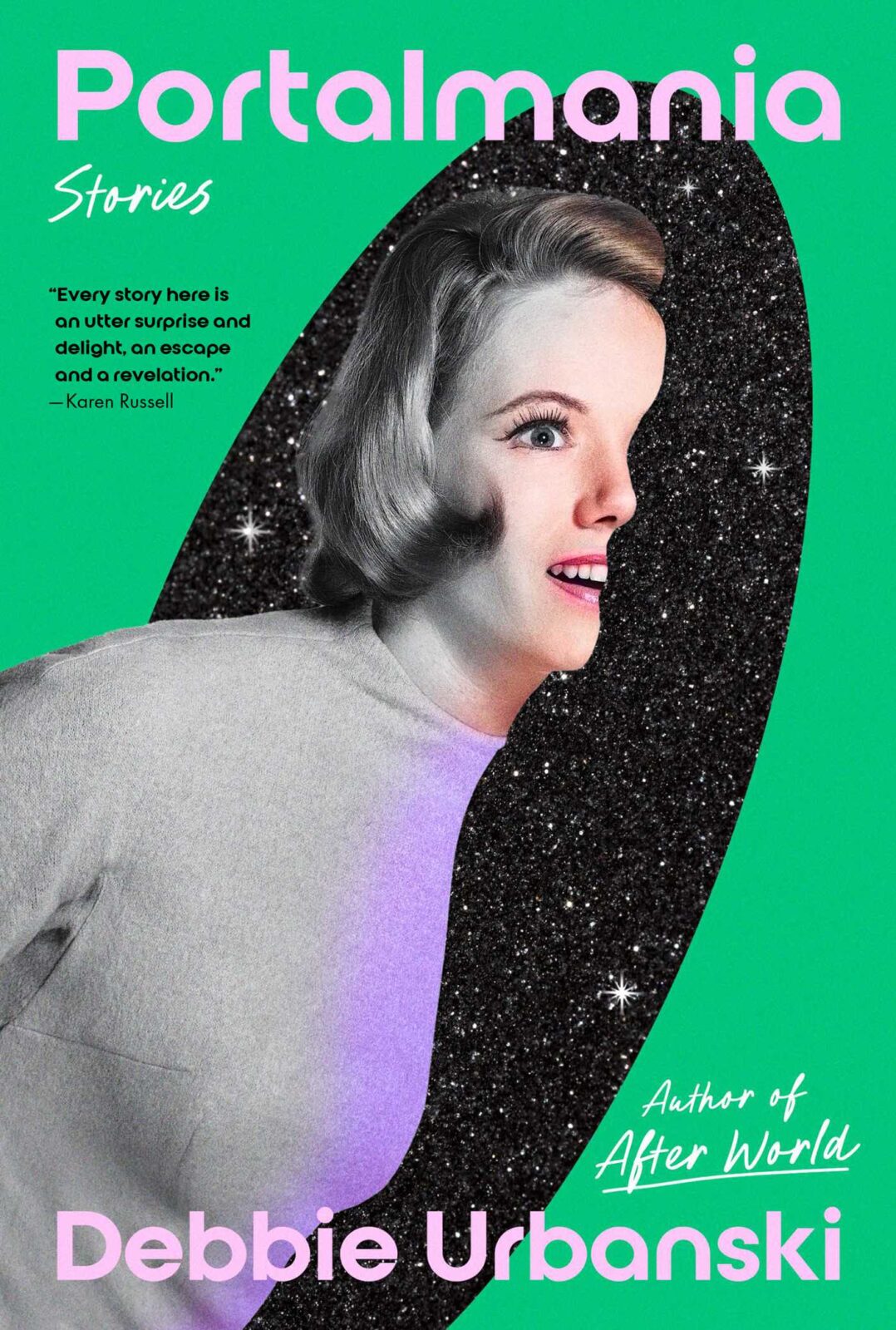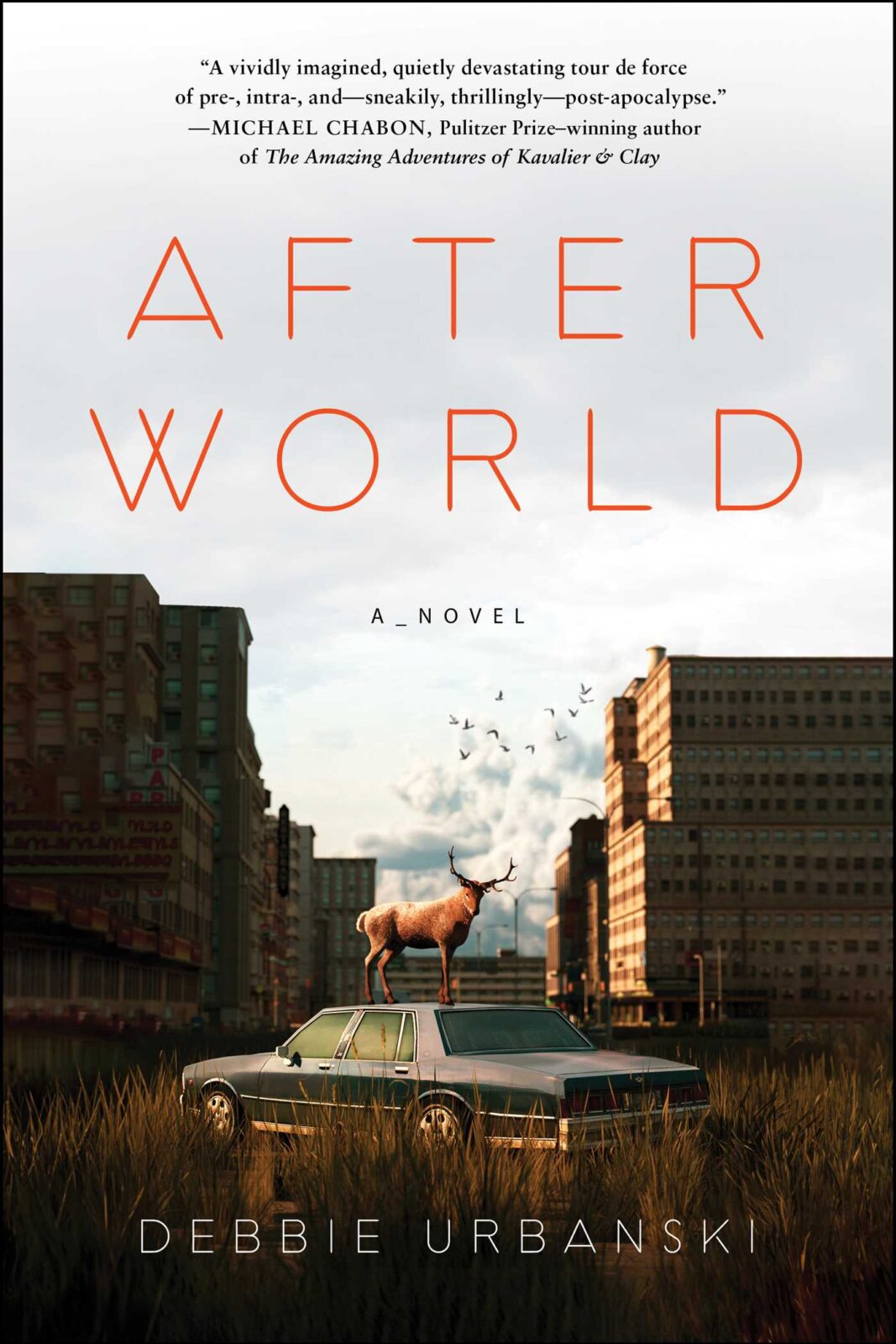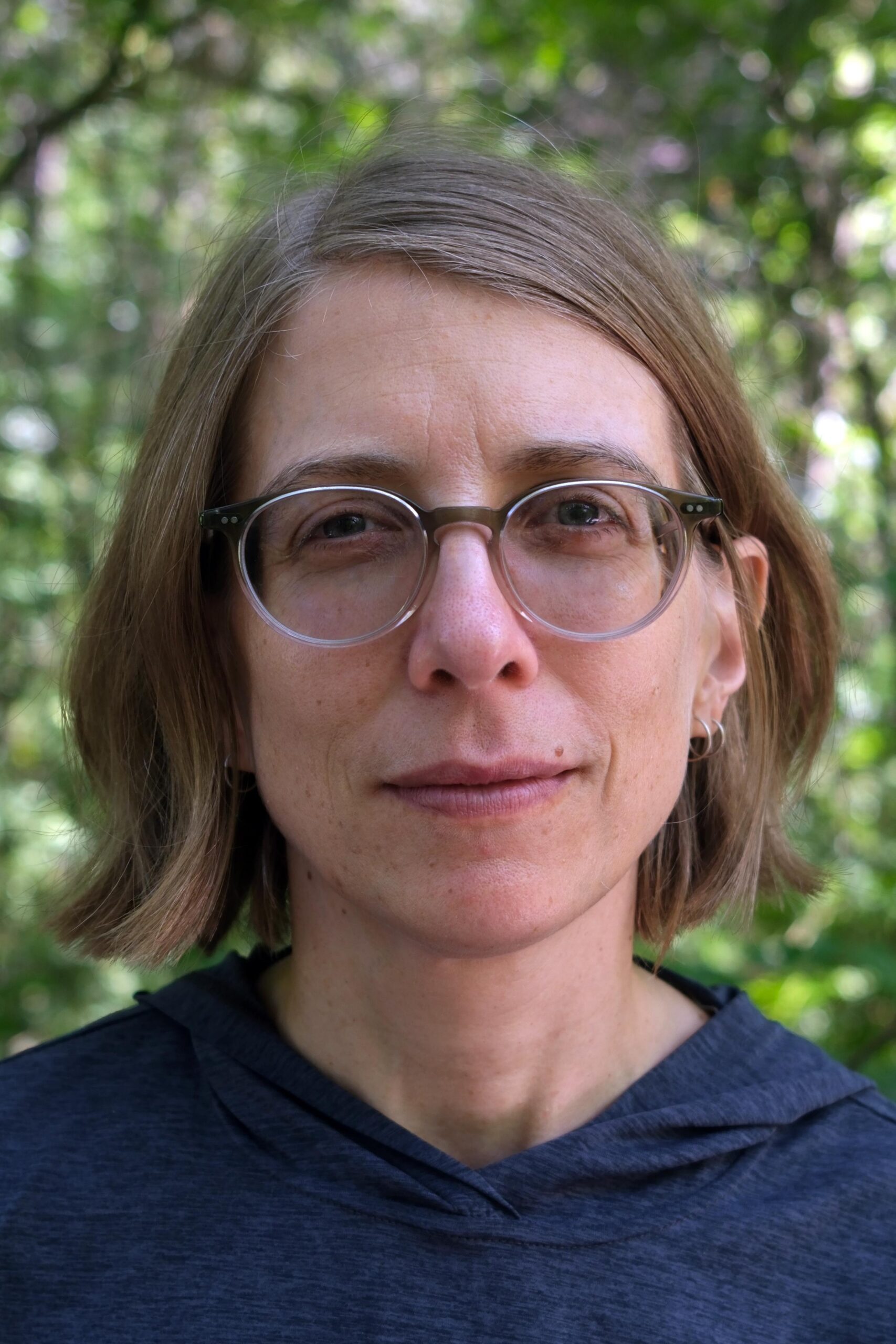Debbie Urbanski is an acclaimed author of both fiction and essays. Simon & Schuster published her debut climate novel, After World, in 2023, and will release her new short story collection, Portalmania, in May.
I was lucky to read an advance copy of Portalmania and was blown away by the characters and tightly held tension in each piece. The emotions feel both realistic and larger-than-life. Urbanski’s prose is clean, precise, bringing each scene into sharp focus. This is the sort of speculative fiction that might leave you uncomfortable. I’m sure I’ll be thinking of these stories long after finishing the book.
If you can’t wait for a taste of Urbanski’s short fiction, check out “How To Remain Safe During A Conversation If You’re Somebody’s Wife,” an edge-of-reality nail-biter published here at Uncharted in 2021.
Thanks to Debbie for taking time out of her busy schedule to answer my questions!
—Myna Chang
***

Myna Chang: Tell us about Portalmania! What themes do you explore, and what are your characters up to?
Debbie Urbanski: My main characters are often mothers and wives who are stuck in their lives for one reason or another. These women are trying—and usually failing—to become unstuck. There are portals, of course, but there are also monsters, witches, grounded realism, heartbreak, murder, therapy, and both emotional and physical transformation. I’m trying to figure out in these stories where love ends and something else begins—and what is that something else? I’m interested in portraying love that looks different than my characters or readers might expect, love that might not be pretty or beautiful but I think it’s still a form of love.
MC: What’s unique about this collection?
Debbie: I have always loved portal stories ever since I was a kid, but generally such stories—think Alice in Wonderland or the Chronicles of Narnia—are about the people who go through portals. I’m more interested in the people who are left behind, people who need a portal just as badly but who can’t find one. Though I’m also bringing in portals as an abstract concept, portals as this idea of escaping from our lives or not feeling like we belong in our lives. Because I identify as asexual, I have a different take on sex, intimacy, and love than most people, and that different perspective definitely comes through in these stories. And though I’m drawing on horror, fantasy, and sci-fi, I aimed to keep these stories grounded firmly in realism and reality. I want the situations in Portalmania to feel very real, even if they are fantastical or horrific in nature.
MC: When a reader finishes the last word in the book, what emotion will they be feeling?
Debbie: Devastation and hope equally. I would be pleased if, once the book is closed, the reader wishes to burn the world down and create something better in its place.
MC: What was your inspiration for the collection?
Debbie: When I was having an intense time in my life a while back, the relationships I saw portrayed in stories and novels didn’t feel true to me anymore. I wanted to write stories that captured my intense emotional experiences of being a mother and a wife. I find our current definitions of love to be narrow and confining—not necessarily who can love whom but more this is what love looks like—and I wanted to try to widen those definitions.
MC: Which of the stories was most challenging to write? Do you have a favorite?
Debbie: They all were challenging to write, to be honest—I seem to suffer maybe more than other writers with extreme doubt and frustration when I’m in the middle of crafting a story. But my favorite is “The Dirty Golden Yellow House.” I wrote these stories over eight years and “The Dirty Golden Yellow House” was the last story I wrote in this collection. At that time I had grown disappointed with fiction—it felt like a game of “let’s pretend” and I had grown tired of pretending. So I let myself in this story do whatever I want. It’s an angry story, angry both at the story form itself and at pre-existing ideas of marriage and love, but it’s also the first story where I felt like giving the main character a good degree of agency. It felt like a big turning point when I wrote it.
MC: Do any of the portals feel especially inviting to you? Which of your characters would you most enjoy spending time with?
Debbie: To be honest, I don’t want to spend time with any of these characters anymore. It’s a hard collection for me to reread. The main characters remind me of myself during difficult times of my life. But what I love about this book on a personal level is that it feels like a project I’ve completed, and now I can move on. So I’m looking forward to spending time with a new sort of character. In terms of which portals I like the most—I’m trying hard to want the life I have. A narrator in one of my stories thinks of portals being suspect and dangerous, and I agree with that take on the mental health level.
MC: Did you have any surprises or problems during the writing or publishing process? How did you maintain your motivation?
Debbie: Motivation for writing short stories was easier for me than with a novel, as even if a story hadn’t been accepted yet, it was comforting knowing a piece was being considered at several places. And even with rejections, sometimes you might get a positive note or two. I also truly felt like these stories were important—to me personally but also on a larger societal level. I wanted (and still want) to challenge the widely held belief that sex is necessary for intimacy and love—and also that sex in a partnered relationship is always an expression of love. This kept me motivated for years.

MC: Your acclaimed debut novel, After World, was published in late 2023, followed by the paperback edition in September 2024. I imagine it might feel overwhelming to already be in the promotion trenches with a new collection. I’m curious about how you managed the schedules for producing two books in such a short timeframe. Have you become a master of schedule juggling?
Debbie: I’m feeling a bit burned out from all the marketing. Even at a big 5 publisher, writers are generally involved in promoting their book these days. I did have a couple months in between After World being out and before editorial work on Portalmania began, but there sure were a lot of deadlines for a while.
MC: After World was named a Best Book of the Year by the Los Angeles Times, the San Francisco Chronicle, Engadget, Strange Horizons, and Booklist. It also was chosen for the Climate Reality Project Book Club. Tell us about the book. What themes does it tackle? Do any of those themes reverberate with your new collection?
Debbie: After World is a lightly experimental novel, meaning I play around some with form as well as apocalyptic tropes. People either seem to love the book or hate it. I think readers who want something predictable, easy, familiar, or upbeat may have trouble with it. Versus readers who want to be involved in figuring things out in a book, who are looking more for engagement than escape. I’m not making value judgements here – I think there’s a place for all sorts of books and all sorts of readers in the world. But I get frustrated when the wrong reader chooses to read a book that wasn’t meant for them and then they blame the book (or the author) for their inability to connect with it.
The Portalmania stories feel like a separate project from After World. Portalmania allowed me to examine some themes and conflicts in my own life, while After World was a relief in that it wasn’t personal in the same way. In After World, I’m thinking about species extinction, artificial intelligence, climate change, and an eco-centric world. That said, I suppose both books contain a similar intensity and may make the reader uncomfortable. I’m trying to change the world a little with both books.
MC: Does your writing process differ when you’re approaching a novel versus a short story?
Debbie: I’m still more comfortable and confident writing short stories and essays. I’m hoping with my second novel I’ll be more accepting that the novel process, my version of it anyway, is messy. I tend, with both stories and my novel, to free write and then assemble what I wrote but in a different order in a collage-like fashion. Sometimes I’m literally on the floor of the attic, ripping apart pieces of paper at the sentence level and stapling them in a new order. This is easier to do for sure with shorter pieces. I often wish I could start at the beginning of a piece and then write a story or a novel all the way through to the end but my brain doesn’t work like that.
There was a lot more self-doubt and despair I had to push through when writing my novel. It was difficult to exist in this vacuum without any outside encouragement for years. (I actually ended up turning some early chapters of After World into short stories and then sending them out because I needed some kind of external validation.) I think writing a novel takes a lot more trust in oneself as a writer. It takes a great deal of courage to let go of sections, ideas, wrong turns, or half-written books that no longer interest you, no matter how many weeks or months you’ve invested in them. I’ve learned that experimentation is tolerated more easily in a short story form. With a novel, I think the reader’s comfort level and engagement becomes a factor because of commercial expectations (i.e. people are going to have to want to buy the book).
MC: I’d love to hear more about your stories for children and teens. What are your favorite subjects & topics to cover for the younger audience? Any advice for writers hoping to break into that market segment?
Debbie: I read to my kids a lot and there was a certain age when it was hard to find the fantasy stories that my daughter liked. I loved portal stories even back then, but Alice’s Adventures in Wonderland was a surprisingly hard read-a-loud—it didn’t always make linguistic or logical sense. So I decided to write a children’s story that I thought my daughter would like. I particularly enjoyed writing stories that felt important to me. Jestine Ware, one of my editors at Spider (the Cricket Media magazine for 6 to 9 year olds), wanted more stories portraying LGBTQIA+ families but she wasn’t getting them, so she asked me to write one. I wrote a hiking story about a family with two moms—this ended up being the first full-length story with LGBTQIA characters in Spider. I also loved writing for teens, especially when the stories revolved around asexuality or pushing back on fantasy tropes, the kinds of stories I wish I could have read in high school. I seemed to have success writing in the genres I loved (fantasy, detective mysteries), using humor when I could, and not being afraid to write in an interesting way, or a way that interested me at least—even if I was writing for a young audience.
MC: What’s your favorite thing about writing?
Debbie: I enjoy when I reach the stage where, after many, many revisions, I’m reading something I wrote, usually out loud, and I can’t remember writing it and I can’t believe I was able to write something like that. I do love being part of the writing community as well, whether that’s DMing on Instagram with a writer I admire, or trading books with another author, or forming long-distance friendships over a love of stories, or just talking about favorite books with other writers.
MC: Do you have any hobbies or other non-writing activities? What do you do for fun?
Debbie: My family and I play a lot of board games together, and I try to spend the weekends hiking in the state forests south of Syracuse. Lately some friends and I have been entering puzzle competitions at the local libraries—it is way too much fun and the perfect way for the introverted me to hang out.
MC: What do you wish I’d asked?
Debbie: I’m not naturally surrounded by writers. I don’t teach at a university, and my husband and I own a letterpress print shop. But I’ve learned it’s possible to create a writing community for myself. There was a rather lonely time after I graduated from my MFA program when I was waiting around, hoping some other writers would contact me to be part of a group—but that never happened so I started forming groups myself. Sometimes this means reaching out to people who won’t be interested, but if you reach out to enough authors, you’ll eventually find people who also are looking to connect. My advice to other writers: know that you can build your own writing community no matter where you are (especially now thanks to Zoom).
MC: What’s next for you?
Debbie: I continue to be interested in the apocalypse, perhaps because of how the current times feel, so I still want to explore that theme in some short stories. A second novel is on the distant horizon. I just have to figure out what exactly that looming shape is.
***
DEBBIE URBANSKI is the author of the novel After World. Her stories and essays have been published widely in such places as The Best American Science Fiction and Fantasy, Best American Experimental Writing, The Sun, Granta, Orion, and Junior Great Books. A recipient of a Rona Jaffe Foundation Writers’ Award, she can often be found hiking with her family in the hills south of Syracuse, New York. She is still looking for her portal.
Find Debbie at Instagram and Substack.
Pre-order Portalmania here.
***
MYNA CHANG hosts Electric Sheep SF and publishes MicroVerse Recommended Reading. Her fiction has been selected for the Locus Recommended Reading List, Norton’s Flash Fiction America, and several “Best Of” flash anthologies; her poetry recently received a Rhysling honorable mention. Her collection, The Potential of Radio and Rain, was published by CutBank Books. Find her at MynaChang.com or on Bluesky @MynaChang.
